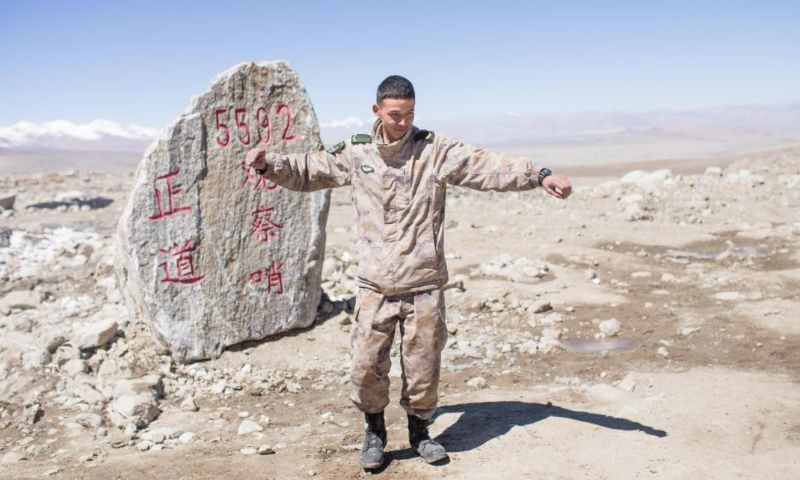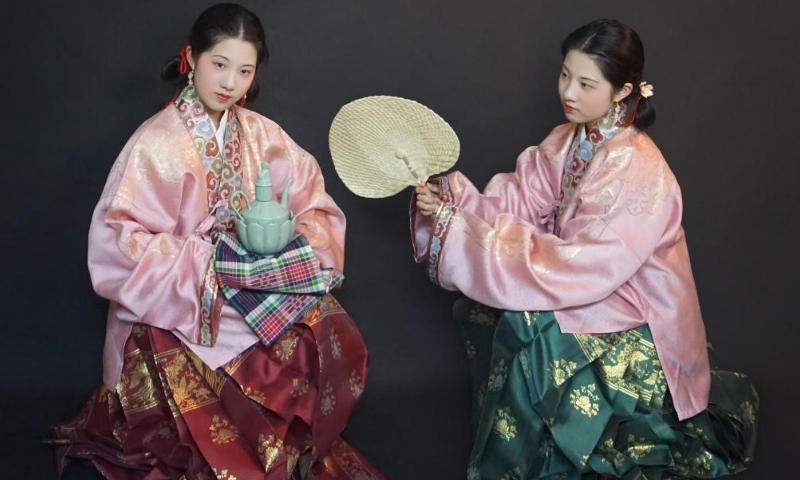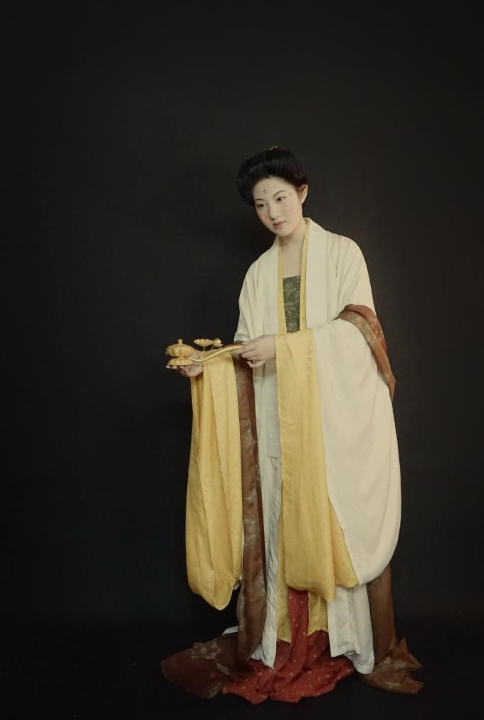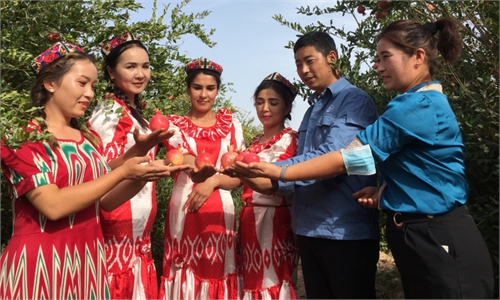IN-DEPTH / IN-DEPTH
Post-00s Chinese confidently express love to their country at bigger stages
Editor's Note:
Youth is the most active and vital force in society. The hopes of a country and the future of a nation lie in the hands of its younger generation.
Under different historic periods, the environment under which the Chinese youth have growing up, the events they have experienced, and the opportunities they were offered are also entirely different. However, what has never changed is that they have always played a vanguard role in the quest for national rejuvenation.
The State Council Information Office of China on April 21 published a white paper titled the "Youth of China in the New Era" on the occasion of the 100th anniversary of the founding of the Communist Youth League of China. "The Chinese Dream is a dream about history, the present, and the future. It is cherished by all of the people, but even more so by the young," it read.
In this vein, the Global Times recently interviewed Chinese people born in the 1950s, 1980s, and 2000s, who had varying experiences in their formative years, to illustrate the dream, the passion, and the beauty of different generations of Chinese young people.
The Beijing 2022 Winter Olympic Games witnessed China's younger generation shine on the global sporting stage. Many post-2000s athletes, including snowboarder Su Yiming in Team China impressed the world with, not only their excellent performances, but also their confident smiles and fluency in multiple languages.
"Living in what could be called the best times in Chinese history, the current young generation enjoys an enabling environment for development and a boundless space to grow," read the white paper "Youth of China in the New Era."
For the post-2000s generation growing up in a prosperous China with rapid-developing economy with a blooming culture and rising international status, the generation represents individuals who are well-educated, experienced in world affairs, and knowledgeable, and have a natural sense of patriotism. They actively express their love for China in various ways, and are always ready to protect the interests of their motherland.
Hang tough
As they were growing up, most Post-2000s individuals were very clear about their social responsibilities. Far from the belief that a modern life will inflict depression on those who try it on, the Gen-Z generation has shown that their patriotism will remain unshaken even by the outside world.
While many Post-2000s individuals are just getting ready to pursue their dreams, some have already chosen to safeguard the country and its people on the frontline, garrisoning in places far away from home and with prevailing environmental conditions that are inhabitable for most of humanity.

Rouzimaiti Tuerxun, a 20-year-old from Kashi, Northwest China's Xinjiang Uygur Autonomous Region, appealed to serve at the "5592" observation point three months after he was enlisted.
The observation point sits on a mountain peak 5,592 meters above sea level in Xigaze, Southwest China's Xizang Autonomous Region, and is known for being the highest watch post for the People's Liberation Army. In winter, the oxygen level in many regions the battalion guards drops to a meager 30 percent of that of other regions in China.
Rouzimaiti was a law student at the Dongbei University of Finance & Economics. He told the Global Times that he had always dreamt of being a soldier. "I feel that we should do something meaningful when we are young," he said. "Being a soldier and being on the frontline defending the border is the most worthy way."
Like Rouzimaiti, many soldiers in his battalion have submitted appeals to devote themselves at the border. They said they have always dreamt of the moment they get to drive away invading forces and defend their country.
Huang Xinyu, Rouzimaiti's brother in arms who was born in 2000, said, "We are a gate and a wall for the motherland. If there is an enemy who wants to invade our territory or sovereignty, he would have to step over my dead body!"
Serving in the army, especially in remote regions, these youth enlisters have to give up a lot of joys in their lives - There is no bubble tea, nor an amusement arcade; There is only an endless wilderness shared with bears.
"I chose to come to Xizang to experience the worst. This is an experience that I will be proud of for the rest of my life," Duan Runzhi, 20, a private in the army in Xizang, told CCTV.
Many young border guarders interviewed by the Global Times would also express their faith and willingness in wearing the sword. "If you do not serve the country in the army, you will regret it for the rest of your life," they said.
These patriots not only have to give up a peaceful existence, but some have made the ultimate sacrifice, laying down their lives for the cause while fulfilling their promise to defend the country.
Border hero Chen Xiangrong, sacrificed his life in the Galwan Valley conflict with Indian military in June 2020 when he was only 19 years old.
"My love is crystal clear, it is only for China," Chen wrote when he was 18.
His heroic spirit will live on forever, and the country and the people will always remember the 19-year-old martyr and pay tribute to this young hero and his family.
Promote Chinese culture with pride
Growing up in an era of Chinese culture regaining widespread attention and popularity, China's post-2000s generation, who are confident in getting to know and embrace their country's rich traditional culture, are now voluntarily sharing it with more people globally.

Zhou Hao, 22, is one of numerous young Chinese influencers on social media who are keen on spreading Chinese culture through various aspects, including traditional operas, ancient poetry, and hanfu (traditional Chinese costume).
As a seven-year hanfu enthusiast, Zhou is known by netizens at home and abroad mainly for a "time machine program" she initiated in 2019. The program encourages Chinese youths to learn about the beauty of traditional Chinese clothing, through either trying to wear it once, or, at the very least, enjoying the portraits of Zhou herself in different sorts of hanfu.
To date, Zhou has taken more than 180 sets of portraits of herself under the program, covering almost all the major clothing styles from the Han Dynasty (206BC-AD220) to the 1950s.
Each time, Zhou wears a hanfu in the style of a particular time period in Chinese history, and elaborately does her makes up and hair to match with the general aesthetic of the time.
Almost half of Zhou's hanfu costumes are hand-made by her. "I draw my inspiration from historical materials, such as ancient portraits and clothing-related books, to learn the details of hanfu in different dynasties, from the fabric and cut, to the design and color match," Zhou told the Global Times.

Zhou's program has gained her tens of thousands of followers on Weibo. Many of her viewers and subscribers commented under Zhou's Weibo account, expressing their appreciations for the beautiful portraits she takes, and the efforts she has made in promoting traditional Chinese clothing and culture.
Zhou has also authorized some netizens to share her hanfu portraits on overseas social media platforms. "I hope the program enables more and more people, who may not be very familiar with Chinese culture though, to get a general idea of China's traditional aesthetic," Zhou said.
Unlike their predecessors who prefer foreign culture, Zhou finds that many of her peers, who don't keep Hollywood blockbusters, Japanese anime, and K-pop music at a distance though, are also proud to be "big fans" of Chinese culture.
"We love our own culture, and we welcome foreign culture," she told the Global Times. "The 'beauty' we post-2000s individuals chase is diversified and inclusive - exactly the two precious characteristics what I have learned from traditional Chinese culture."
Youth is the most active and vital force in society. The hopes of a country and the future of a nation lie in the hands of its younger generation.
Under different historic periods, the environment under which the Chinese youth have growing up, the events they have experienced, and the opportunities they were offered are also entirely different. However, what has never changed is that they have always played a vanguard role in the quest for national rejuvenation.
The State Council Information Office of China on April 21 published a white paper titled the "Youth of China in the New Era" on the occasion of the 100th anniversary of the founding of the Communist Youth League of China. "The Chinese Dream is a dream about history, the present, and the future. It is cherished by all of the people, but even more so by the young," it read.
In this vein, the Global Times recently interviewed Chinese people born in the 1950s, 1980s, and 2000s, who had varying experiences in their formative years, to illustrate the dream, the passion, and the beauty of different generations of Chinese young people.
The Beijing 2022 Winter Olympic Games witnessed China's younger generation shine on the global sporting stage. Many post-2000s athletes, including snowboarder Su Yiming in Team China impressed the world with, not only their excellent performances, but also their confident smiles and fluency in multiple languages.
"Living in what could be called the best times in Chinese history, the current young generation enjoys an enabling environment for development and a boundless space to grow," read the white paper "Youth of China in the New Era."
For the post-2000s generation growing up in a prosperous China with rapid-developing economy with a blooming culture and rising international status, the generation represents individuals who are well-educated, experienced in world affairs, and knowledgeable, and have a natural sense of patriotism. They actively express their love for China in various ways, and are always ready to protect the interests of their motherland.
Hang tough
As they were growing up, most Post-2000s individuals were very clear about their social responsibilities. Far from the belief that a modern life will inflict depression on those who try it on, the Gen-Z generation has shown that their patriotism will remain unshaken even by the outside world.
While many Post-2000s individuals are just getting ready to pursue their dreams, some have already chosen to safeguard the country and its people on the frontline, garrisoning in places far away from home and with prevailing environmental conditions that are inhabitable for most of humanity.

Rouzimaiti Tuerxun performs Xinjiang dance at the 5592 observation point. Photo: Shan Jie/GT
Rouzimaiti Tuerxun, a 20-year-old from Kashi, Northwest China's Xinjiang Uygur Autonomous Region, appealed to serve at the "5592" observation point three months after he was enlisted.
The observation point sits on a mountain peak 5,592 meters above sea level in Xigaze, Southwest China's Xizang Autonomous Region, and is known for being the highest watch post for the People's Liberation Army. In winter, the oxygen level in many regions the battalion guards drops to a meager 30 percent of that of other regions in China.
Rouzimaiti was a law student at the Dongbei University of Finance & Economics. He told the Global Times that he had always dreamt of being a soldier. "I feel that we should do something meaningful when we are young," he said. "Being a soldier and being on the frontline defending the border is the most worthy way."
Like Rouzimaiti, many soldiers in his battalion have submitted appeals to devote themselves at the border. They said they have always dreamt of the moment they get to drive away invading forces and defend their country.
Huang Xinyu, Rouzimaiti's brother in arms who was born in 2000, said, "We are a gate and a wall for the motherland. If there is an enemy who wants to invade our territory or sovereignty, he would have to step over my dead body!"
Serving in the army, especially in remote regions, these youth enlisters have to give up a lot of joys in their lives - There is no bubble tea, nor an amusement arcade; There is only an endless wilderness shared with bears.
"I chose to come to Xizang to experience the worst. This is an experience that I will be proud of for the rest of my life," Duan Runzhi, 20, a private in the army in Xizang, told CCTV.
Many young border guarders interviewed by the Global Times would also express their faith and willingness in wearing the sword. "If you do not serve the country in the army, you will regret it for the rest of your life," they said.
These patriots not only have to give up a peaceful existence, but some have made the ultimate sacrifice, laying down their lives for the cause while fulfilling their promise to defend the country.
Border hero Chen Xiangrong, sacrificed his life in the Galwan Valley conflict with Indian military in June 2020 when he was only 19 years old.
"My love is crystal clear, it is only for China," Chen wrote when he was 18.
His heroic spirit will live on forever, and the country and the people will always remember the 19-year-old martyr and pay tribute to this young hero and his family.
Promote Chinese culture with pride
Growing up in an era of Chinese culture regaining widespread attention and popularity, China's post-2000s generation, who are confident in getting to know and embrace their country's rich traditional culture, are now voluntarily sharing it with more people globally.

Zhou Hao wears hanfu from the Ming Dynasty (1368-1644) style. Photo: Courtesy of Zhou Hao
Zhou Hao, 22, is one of numerous young Chinese influencers on social media who are keen on spreading Chinese culture through various aspects, including traditional operas, ancient poetry, and hanfu (traditional Chinese costume).
As a seven-year hanfu enthusiast, Zhou is known by netizens at home and abroad mainly for a "time machine program" she initiated in 2019. The program encourages Chinese youths to learn about the beauty of traditional Chinese clothing, through either trying to wear it once, or, at the very least, enjoying the portraits of Zhou herself in different sorts of hanfu.
To date, Zhou has taken more than 180 sets of portraits of herself under the program, covering almost all the major clothing styles from the Han Dynasty (206BC-AD220) to the 1950s.
Each time, Zhou wears a hanfu in the style of a particular time period in Chinese history, and elaborately does her makes up and hair to match with the general aesthetic of the time.
Almost half of Zhou's hanfu costumes are hand-made by her. "I draw my inspiration from historical materials, such as ancient portraits and clothing-related books, to learn the details of hanfu in different dynasties, from the fabric and cut, to the design and color match," Zhou told the Global Times.

Zhou Hao wears hanfu of Five Dynasties and Ten States (902-979) style. Photo: Courtesy of Zhou Hao
Zhou's program has gained her tens of thousands of followers on Weibo. Many of her viewers and subscribers commented under Zhou's Weibo account, expressing their appreciations for the beautiful portraits she takes, and the efforts she has made in promoting traditional Chinese clothing and culture.
Zhou has also authorized some netizens to share her hanfu portraits on overseas social media platforms. "I hope the program enables more and more people, who may not be very familiar with Chinese culture though, to get a general idea of China's traditional aesthetic," Zhou said.
Unlike their predecessors who prefer foreign culture, Zhou finds that many of her peers, who don't keep Hollywood blockbusters, Japanese anime, and K-pop music at a distance though, are also proud to be "big fans" of Chinese culture.
"We love our own culture, and we welcome foreign culture," she told the Global Times. "The 'beauty' we post-2000s individuals chase is diversified and inclusive - exactly the two precious characteristics what I have learned from traditional Chinese culture."




